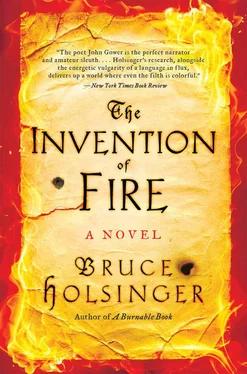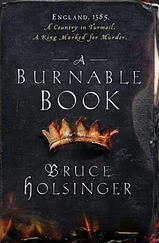Bruce Holsinger - The Invention of Fire
Здесь есть возможность читать онлайн «Bruce Holsinger - The Invention of Fire» — ознакомительный отрывок электронной книги совершенно бесплатно, а после прочтения отрывка купить полную версию. В некоторых случаях можно слушать аудио, скачать через торрент в формате fb2 и присутствует краткое содержание. Год выпуска: 2015, Издательство: HarperCollins, Жанр: Исторический детектив, на английском языке. Описание произведения, (предисловие) а так же отзывы посетителей доступны на портале библиотеки ЛибКат.
- Название:The Invention of Fire
- Автор:
- Издательство:HarperCollins
- Жанр:
- Год:2015
- ISBN:нет данных
- Рейтинг книги:3 / 5. Голосов: 1
-
Избранное:Добавить в избранное
- Отзывы:
-
Ваша оценка:
- 60
- 1
- 2
- 3
- 4
- 5
The Invention of Fire: краткое содержание, описание и аннотация
Предлагаем к чтению аннотацию, описание, краткое содержание или предисловие (зависит от того, что написал сам автор книги «The Invention of Fire»). Если вы не нашли необходимую информацию о книге — напишите в комментариях, мы постараемся отыскать её.
The Invention of Fire — читать онлайн ознакомительный отрывок
Ниже представлен текст книги, разбитый по страницам. Система сохранения места последней прочитанной страницы, позволяет с удобством читать онлайн бесплатно книгу «The Invention of Fire», без необходимости каждый раз заново искать на чём Вы остановились. Поставьте закладку, и сможете в любой момент перейти на страницу, на которой закончили чтение.
Интервал:
Закладка:
He shrugged. “I’ll hie me out to Oxford then, guzzle up all that logic and Ars-totle. Would that suit, Mas’ Gower?” He met my gaze, unblinking.
Chapter 35
Between Micklegate and the church of St. Martin a large crowd had gathered in the butter market, where a pilloried forestaller was getting some minor ridicule from the legitimate sellers in the booths. Margery purchased a disc of butter to go with the loaf bought on Bread Street. Robert drank cool cream from a passed farthing-jug. As they reached the edge of the crowd he watched her rip a piece of bread from the loaf and spread the thick butter on top. She passed the piece to him, then took the jug, washed it down. Yorkshire cream was a different thing than its Kentish cousin. Sharper, thicker, with a sour bite that reminded her of a green apple.
The company had reached York the previous day, with several of the pilgrims coming newly alive at the prospect of a great city and its many temptations. It had been agreed that they would remain an additional night to restore themselves before the final push north to Durham.
York was the only true city Margery had ever visited aside from London, and while it was quite small by comparison, its streets afforded a welcome bustle after so many days of travel through the countryside and its villages. The citizens here were well used to outsiders, too, and she enjoyed her interactions with shopkeepers and hucksters, negotiating their differences of tongue and word with none of London’s often cruel contempt for strangers.
Along the shambles they walked past rows of capons and fat geese, carcasses and cuts of veal, mutton, and lamb, with Robert pointing out the flaws in the lesser meats, the rich marbling in the better. Cheese, fish, greens, and roots: he had a cook’s eye for the fresh and the well colored, and Margery found herself hungering for some stew or sauced roast prepared by his hand. Such were the new intimacies of their relations, the transactions of taste, touch, and smell they shared as they rode and walked, coupled and slept, whispered and looked together at the world around them, as if this swiftly cooling autumn were become a florid spring.
They were standing in the yard before the common hall when a city herald blew for their ears. As the noise lowered a crier ascended one of the horseless wagons before St. Martin. The crowd circled in and tightened, giving Margery the opportunity to press against Robert behind her, and him the chance to circle her lower waist with his hands. She felt the strength of them, wished he would lift her right there before these loud folk of Yorkshire.
The herald blew a last note, then gestured for his companion to begin. The crier looked down at a bill in his left hand. He cupped his right to his mouth, raised his head, and shouted over the crowd.
“Good gentles! Good commons, lords, and ladies alike! Gather round! Gather round, if you will, and hear these words I sing! By order of the high and honorable lord mayor of our city, John de Howden, I bear grim tidings, my good people of York! And what tidings are these? They are tidings of murder! And theft! And yet more murder! We are all enjoined, every man of us, to look abroad and close for one Robert Faulk, cook of Bladen Manor in Kent, and poacher of King Richard’s own royal forests. He travels northward with Margery Peveril, gentlewoman of the same shire-and, goodmen of York, the murderess of her very husband!”
Margery’s skin prickled as the venomous shouts of the townspeople swelled around them.
Whore!
Murderess!
The gallows for them both!
The gallows be too gentle!
She glanced right and left, to see if any of their company were among the crowd. None that she saw, though the crier would surely repeat the proclamation in the coming hours. She stood frozen before the wagon, with Robert clutching her tightly.
“Both are escaped from a king’s gaol in the shire of Kent, and do now flee in adulterous lust together through the realm. There is great bounty promised from His well-beloved Highness King Richard to any man who would aid in their apprehension and seizure, singly or together. And you are warned, fair people of Yorkshire, you are warned to keep your doors shut against the foul intrusion of Robert Faulk and Margery Peveril into your homes and halls! For to knowingly harbor or succor such felonious folk is a seditious crime against the very crown, punishable by the same death to be meted out to them. So sayeth this dire proclamation, and so sayeth your lord mayor, and so sayeth your lord king.”
The crier stepped off the wagon. As the press loosened she grasped Robert’s hand at her waist and pushed with him toward the edge of the square. Soon they found themselves on a narrow street winding toward the Ouse.
“We are as well as dead,” said Margery, feeling her deepest fright since that night in the Kentish wood.
“They’ve no evidence we’re not who we say we are,” said Robert calmly.
She stamped her foot. “You are a fool. We must flee from York this hour. We’ll not return to the inn. I have a stuffed purse at my waist, you have the coin I gave you, and we shall go-”
“Margery.” He grasped her wrist, spun her to face him. “Think of it. Leaving the city alone would only draw attention to ourselves. We must abide here until tomorrow, then leave with our fellowship, just as we would if that cursed crier hadn’t named us true.”
He was right, of course, though as she fell against him she came as close as she had in weeks to giving in to her despair. A swelling part of her wanted simply to end this reckless journey north, to return to Kent and accept whatever fate the sheriffs and justices and God Himself wished them to face. Instead she took his hand and they returned together to the square. The crier was gone, the crowd thinned. Their meal at the inn that night was taken in the familiar company of the pilgrims, with nothing said about Margery Peveril and Robert Faulk, this fugitive pair from the south.
Would their fortune hold? In the days that followed no one in their company confronted them with the crier’s warnings. Yet Margery was surely not imagining the dark looks and furtive whispers spreading through the fellowship as it crawled through the northern reaches of Yorkshire. Had any in their company heard Mariota speak Robert Faulk’s name? Had the widow whispered her suspicions in those days before Margery threatened her? Even so there would be a hesitancy to speak against the couple, for Robert had slowly become the unspoken leader of this pilgrimage, giving small kindnesses and warm words to all. Everyone adored him, man and woman alike, his stories, his manner, his good humor and goodwill. Perhaps they were safe after all.
Perhaps. On the second day out from York she felt a burning in her back, a spreading unease. As Robert rode ahead she glanced behind her to see Constance and Catherine leaning toward each other like trees over a gulch, stealing looks ahead at her as they rode. When they saw her glance back they ceased their talk and straightened themselves, showing her the flattened lines of their lips. She said nothing to Robert about her suspicions, but for the rest of that day and the next, whenever Margery tried to slow her mount and ride at the rear, the sisters slowed with her, silently refusing to give way. They were like sheepdogs, or wardens guarding against a flight. Constance and Catherine, two sisters riding side by side, scowling, murmuring, trading whispers over the road.
Chapter 36
Would they come for me at night or by day? Was I safer in my home or on the streets? How closely were they watching me, if at all?
The attack in Calais and the threat of a knife in the back stayed at the front of my mind as I settled in uneasily at the priory those first days following my return to Southwark. I found myself glancing out the windows, checking the bars on the doors, reacting to every stray noise with a swiveled head, a frightened glare. On the third morning I sent Will Cooper out through the priory gate to circle the outer grounds. When he returned with nothing to report I decided to risk a first outing since my return, giving Jack Norris strict instructions to remain within the house. I dressed down in some of Will’s plain clothes, which fit me well and would make me less conspicuous on the streets of London, as would the hood pulled over my brow.
Читать дальшеИнтервал:
Закладка:
Похожие книги на «The Invention of Fire»
Представляем Вашему вниманию похожие книги на «The Invention of Fire» списком для выбора. Мы отобрали схожую по названию и смыслу литературу в надежде предоставить читателям больше вариантов отыскать новые, интересные, ещё непрочитанные произведения.
Обсуждение, отзывы о книге «The Invention of Fire» и просто собственные мнения читателей. Оставьте ваши комментарии, напишите, что Вы думаете о произведении, его смысле или главных героях. Укажите что конкретно понравилось, а что нет, и почему Вы так считаете.












